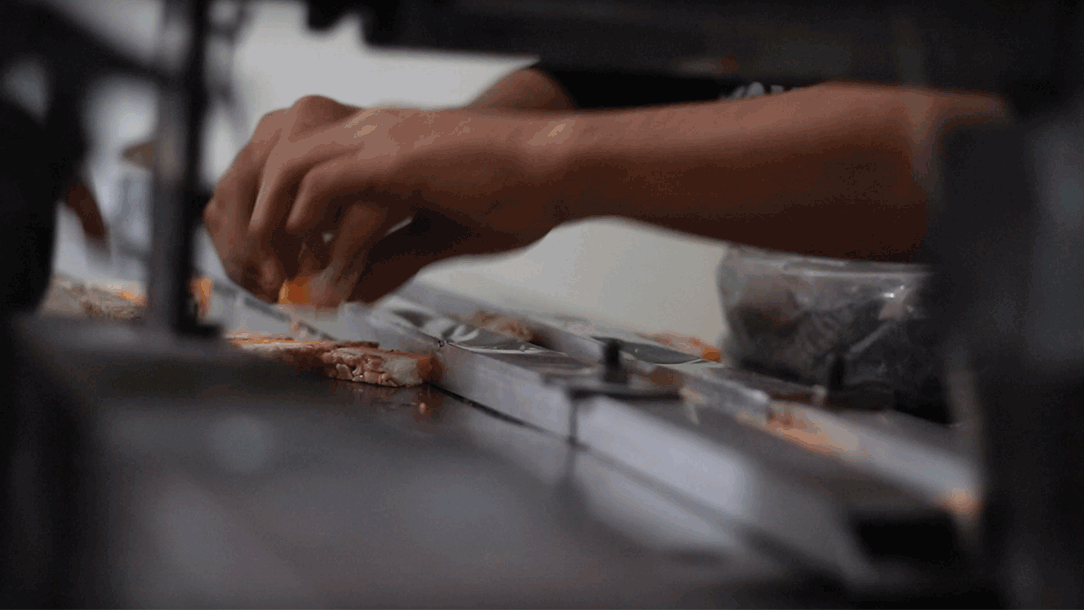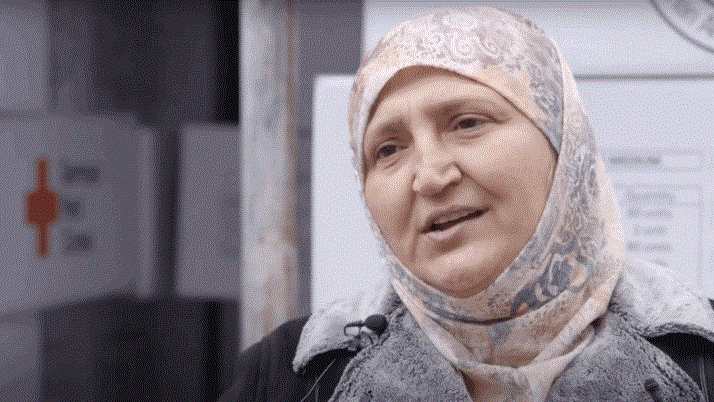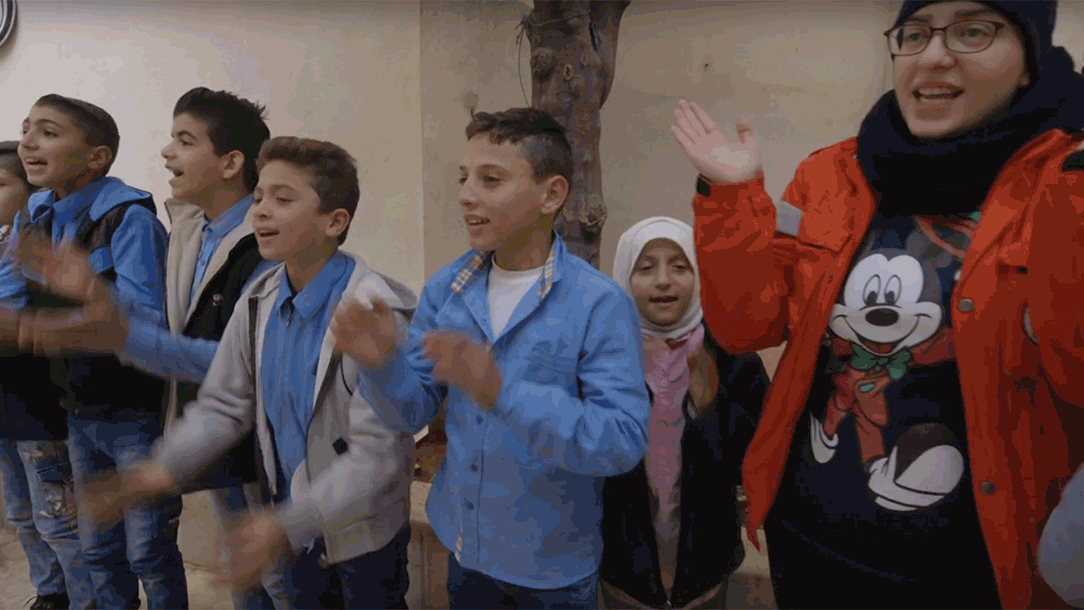What's happening in Syria: how the Red Cross has helped six million people living through the Syrian Crisis
The conflict in Syria has made millions of Syrians refugees and millions more are in need of the basics to survive. Here, people share their stories of how life has improved after receiving aid from the Red Cross Syria efforts.
What is the Syrian conflict and what's happening now?
Last updated 4 August 2023
The Syrian crisis is one of the largest and most complex humanitarian crises in the world, the impact of which is hard to overstate. The Syrian conflict has killed at least 500,000 people since it began in 2011.
11.7 million people – more than half the country’s population – are currently in need of humanitarian aid and continue to seek safety in Syria. The arrival of coronavirus in 2020 has made an unimaginably difficult situation even worse.
In a report from May 2023, the BBC stated: "In addition to the bloodshed, more than half of Syria's pre-war population of 22 million have had to flee their homes. Some 6.8 million are internally displaced, with more than two million living in tented camps with limited access to basic services."
The coronavirus pandemic presented a major threat to life in stable countries with robust healthcare systems: in a place where resources like clean water and soap are in short supply, the impacts were catastrophic.
It is not just the virus itself that continues to pose a threat. In Syria, unemployment is above 50 per cent and the price of bread has doubled in a country where 80 per cent of people live on just £1 per day. Where food is concerned, 50 per cent of people will go to bed hungry.
Without humanitarian aid, millions of Syrians - young and old, women and men, people who have already had to flee the Syrian conflict up to ten times - will continue to suffer.
An estimated 100,000 people live in camps across North East Syria alone. In these camps, social distancing has been virtually impossible, with cramped conditions meaning that people have had a much greater risk of catching the virus.
With support from the British Red Cross and the Red Cross Movement, thousands of staff and volunteers from Red Cross partners the Syrian Arab Red Crescent have been trained to respond to the outbreak and can continue to reach thousands of people with food, water, and healthcare.
Donations to our global coronavirus appeal will help us keep more people safe from the impacts of the virus.
“More than half of Syria's pre-war population of 22 million have had to flee their homes. Some 6.8 million are internally displaced, with more than two million living in tented camps with limited access to basic services. " BBC News
When and why did the Syrian conflict start?
The Red Cross and the Syrian Arab Red Crescent reach more communities than any other agency. To date, six million people living through the Syrian crisis have directly benefited from your donations. Your support helped us provide 580,000 food items and distribute over 1.5 million other items such as blankets and mattresses. We’re also helping people who have lost everything learn new skills and earn a living by growing vegetables and farming sheep.
The Syrian crisis began in 2011 when waves of pro-democracy protests were underway across large parts of the Middle East, known as the Arab Spring. Protests began in Syria and, by July 2011, armed resistance groups had formed. Before long, Syria had descended into a civil war that continues to this day.
Today, there are dozens of state and non-state actors involved in the fighting – making it difficult to understand what is going on and why there is still conflict in Syria.
What we're doing to help those in the Syria
The Red Cross and the Syrian Arab Red Crescent reach more communities than any other agency. To date, six million people have directly benefited from your donations.
Your support helped us provide 580,000 food items and distributed over 1.5 million other items such as blankets and mattresses. We’re also helping people who have lost everything learn new skills and earn a living by growing vegetables and farming sheep.
Supporting small businesses
One person we have helped is Fatima Khayat, a widow and a baker with an irrepressible smile.
Fatima’s modest workshop bears the same scars of conflict as Aleppo.
Inside however, the place is a hive of activity. Machines whirr and employees chatter as they twist plastic wrapping paper around the produce they have each come to see as an unlikely means to a brighter future.
“[The cookies are] coloured especially for children,” said Fatima, that smile hard to conceal. It is a sweet mainly for kids.
“Every time I see my project growing, I thank God. We started simple and now we are enhancing it. I feel very happy and we will start making more types.”
EVERY TIME I SEE MY PROJECT GROWING, I THANK GOD.FATIMA KHAYAT
Fatima’s grant of around £750 was one of around 350 made to budding entrepreneurs in Aleppo.
Her business has been so successful that she has recently started sending her produce to retailers in Damascus, Homs, and Hama. She has also managed to employ five people.
“It’s a far cry from how life used to be," continued Fatima. "I feel happiness that I have never felt before.
“When my husband died – only God knows how we lived. I subscribed my children to an orphan charity and they paid us a little. We lived as if we were dead. But now, thank God, things got better and with God, things will become better still.”
Caring for those in need
An estimated 2.7 million people have been injured in the Syrian conflict. Many hospitals have been damaged or destroyed in the fighting, meaning that people struggle to get the healthcare they need.
Nay el Hbous instead relies on supplies from the Syrian Arab Red Crescent to care for her daughter.
“I have a daughter with brain damage,” she said. “She can’t see, she can’t eat, talk, or walk. She always needs milk, diapers, medicine and of course medical treatment.
“She was just six months old when she got sick.”
Throughout the conflict in Syria, civilians have been subject to attacks, including the use of barrel bombs. There have also been widespread reports of chemical weapons attacks. Now resettled in Damascus, Nay is doing her best to support her daughter.
“I take her to the bathroom and bathe her. I don’t have the money to buy her [special] food so I chew her every bite and put it in her mouth.
“It is very hard because most days I don’t have money to buy her what she needs.”
“The diapers and detergent are the most important,” said Nay of the support she receives. “But of course, there are a lot of other things like the wheelchair.
“I wish she gets treated. There is a treatment for her but outside Syria. If she got her treatment I know she would heal because she got better when she was younger. It all depends on how much I can help her and the medicine.”
Bad news brings more questions
Syria's children have been waking up scared for twelve long years. Many are too young to remember their country before the conflict.
Yet glancing around the Bayada Community Centre in east Aleppo, you wouldn’t know it.
The children laugh as they sing nursery rhymes under the direction of a group of dedicated young volunteers from the Syrian Arab Red Crescent. The joyful atmosphere is a far cry from the destruction that reigns outside the safety of the centre’s walls.
Providing psychosocial support
24-year-old George has been volunteering in the centre since 2014.
“They have seen a lot of trauma,” said George. “Children come to us afraid. When they hear a noise they get scared. But we’re going to recover from it. “I hope they are really making a better future for our country. I see a lot of talent here – like drawing, singing, there are lots of talents.”
The centre, which is supported by the British Red Cross, was set up to provide psychosocial first aid to children.
Volunteers are trained to spot children who might need mental health or child protection services and refer them to a specialist for help. Across Syria, some 45,000 people benefited from psychosocial support projects funded by the British Red Cross in 2018.
Your support makes a huge difference
Supporting our Syria Crisis Appeal will help provide food, mattresses, blankets, and vital services.
Together with the Syrian Arab Red Crescent, we deliver emergency aid across the front lines to reach people most affected by the conflict. We will also work with our partners to reach Syrian refugees living in nearby countries.
Please support our Syria Crisis appeal.
What needs to happen in Syria now?"
Today, the situation in Syria remains complex.
Fighting is concentrated in the northwest of the country around Idlib province. Idlib is home to around three million people, half of whom were transferred there from other parts of Syria.
Since December 2019, more than 900,000 people have been forced to flee from deadly violence – the single largest displacement since the conflict in Syria began. Weeks of intense violence have emptied entire towns in the northwest Idlib province and sent huge numbers of civilians fleeing north towards the Turkish border.
Today, there are just over 17.3 million people left in Syria: around three to four million people have fled the country and around 570,000 have been killed over the past decade. Outside of Idlib, active fighting has largely ended but the situation remains dire. More than eight out of ten people - 83 per cent - live beneath the poverty line, unable to meet their basic needs. This is why the pandemic could be so dangerous.
Half of all healthcare facilities in Syria are either out of service or only partially operating. Up to 70 per cent of healthcare workers have fled the country and in a population of over 16 million, there are just 325 intensive care beds. Personal protective equipment for the staff that remains is in short supply. And preventative measures such as hand-washing and social distancing are difficult or impossible in the cramped displacement camps where an estimated 6.5 million people now live.
In total, an estimated 11.7m people still need humanitarian assistance inside the country. That’s over two million more than the population of London.
Syrian Crisis Appeal
You can support people affected by the Syrian crisis. To learn more about how your donation could help, click 'DONATE' to visit our Syria Crisis Appeal page.
Donate

